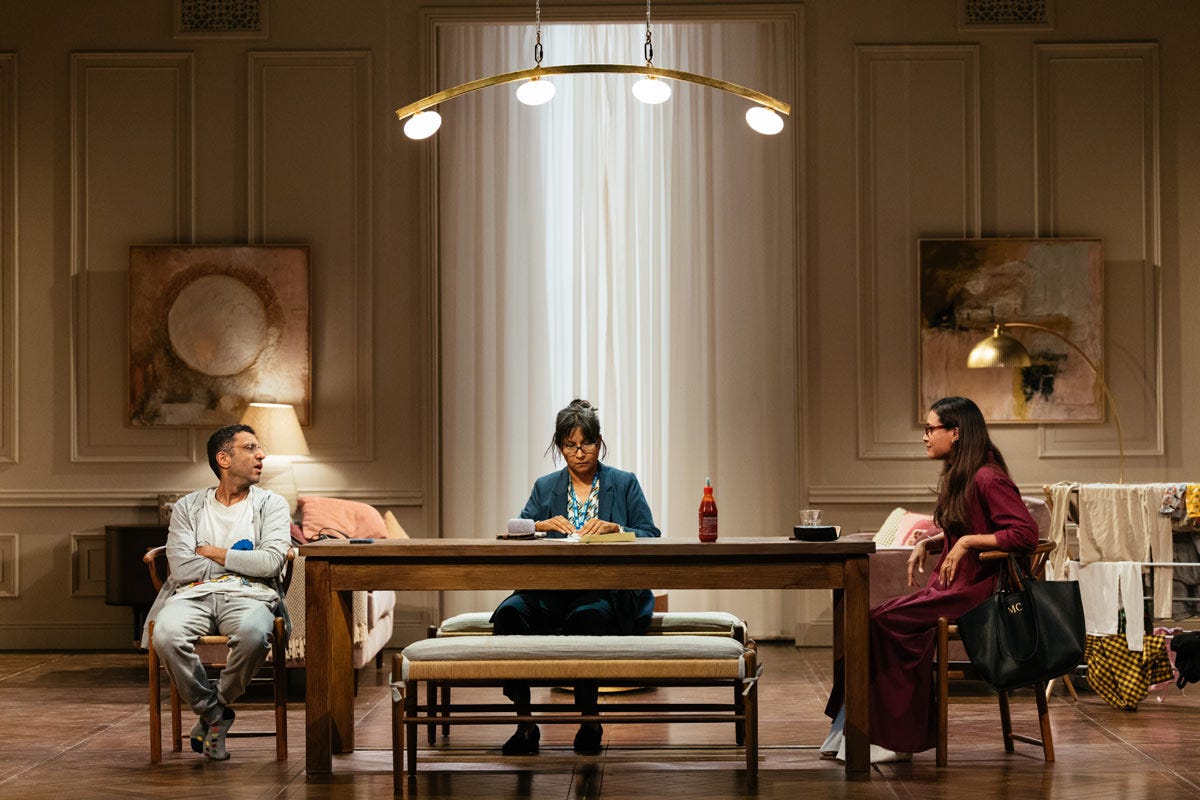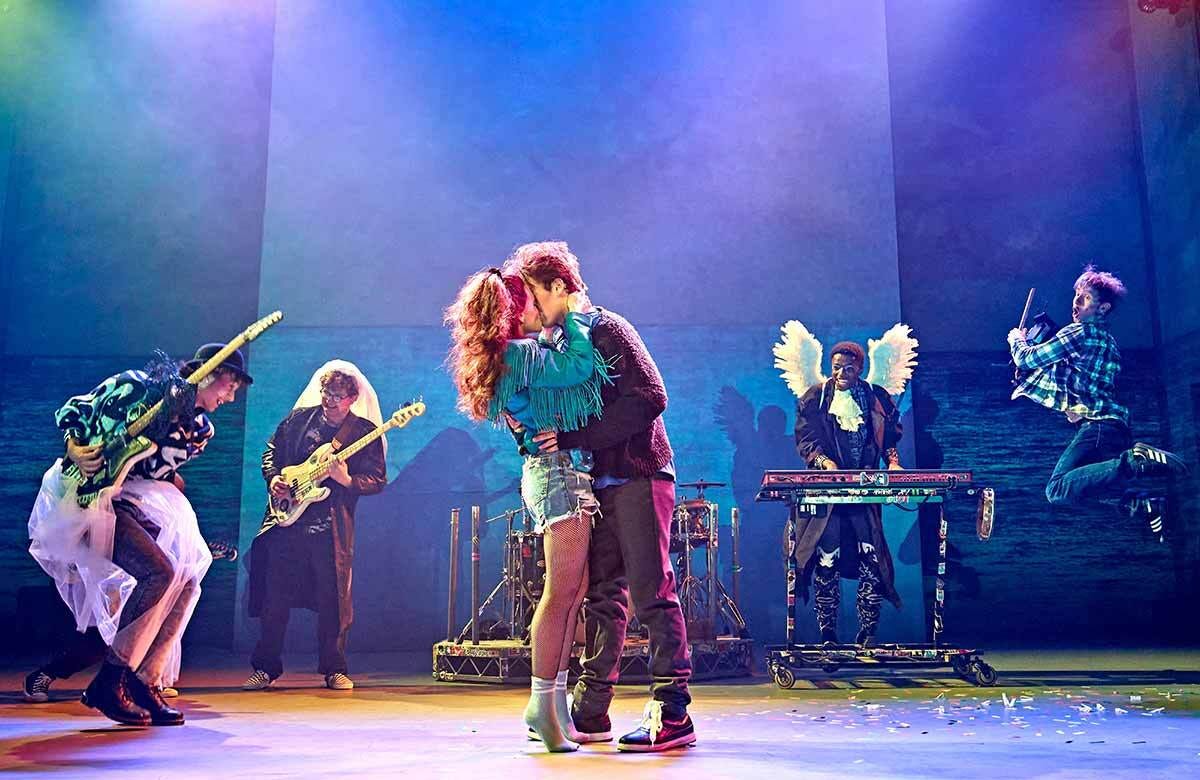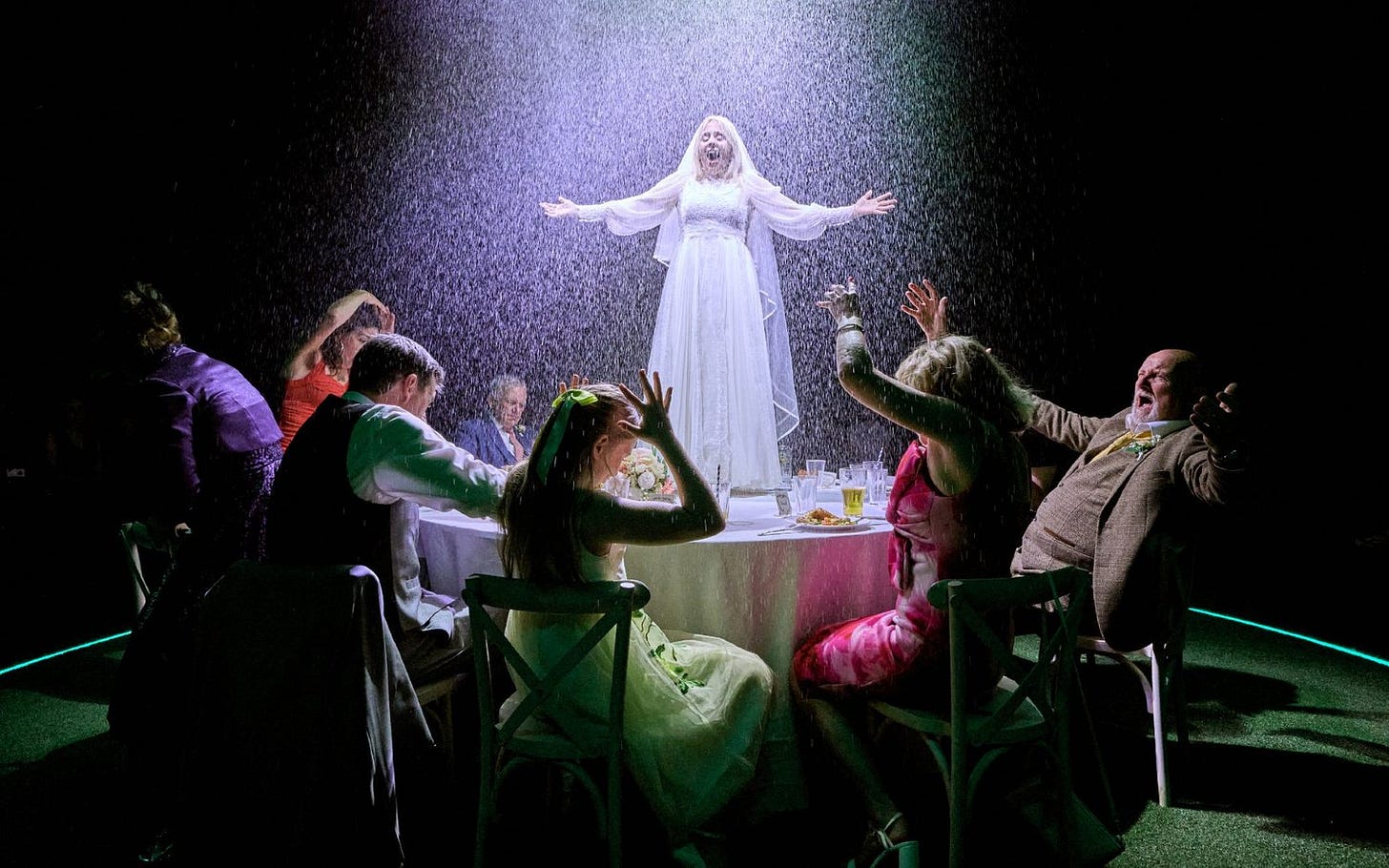London round-up: The Estate, Sing Street and Till the Stars Come Down
I went to London, saw some shows and had some thoughts.
I’m still in London, where in between catching up on shows (see below), I wrote this piece for Exeunt on differing cultural attitudes to on-stage nakedness and that time, 15 years ago, I danced naked on stage at the Barbican.
This newsletter is a pleasure to write, but it takes time. So if you want to support my writing, you can do so for just £5 a month or £50 a year. Or just share this newsletter with someone you think might find it interesting. That helps too.
The Estate, National Theatre
There’s a moment midway through Shaan Sahota’s debut play where it made me momentarily feel sorry for David Cameron. (It soon passed). Let’s backtrack a bit. The Estate begins as a slick, The Thick of It-style satire about Angad (Adeel Akhtar), an ambitious MP making a bid to be leader of the opposition. Despite being publicly school educated – he went to Harrow - he makes a big deal of being the son of an immigrant baggage handler. His comms team (Helena Wilson and Fode Simbo) alternate between trying to get him to apply concealer to mask how tired he looks to ribbing him for coming across as the whitest man ever.
It feels pretty clear what flavour of play we’re going to get - the comedic register is very familiar - but then things shift. Just as Angad is making his bid for the top job, his father dies and it is revealed that, having amassed quite a property portfolio during his lifetime, he has left everything to his son and cut his two daughters, Malicka (Shelley Conn) and Gyan (Thusitha Jayasundera), out of his will. We’re suddenly plunged into an emotionally messy family drama. Angad’s sisters assume he will do right by them, disregard their father’s blinkered wishes and split the money evenly between them. Angad has other ideas. After the initial shock has worn off, he argues that, as the much-wanted only son, he was subject to different pressures than they were. Weakness – emotional and physical - was not tolerated and while Angad’s maleness granted him certain privileges, it also made him more visible in his father’s eyes. He was the one who bore the brunt of his father’s temper. (Sahota is great at only gradually revealing what an overbearing and abusive man their father was in life). Given what he’s been through, Angad feels he’s earned his inheritance. He deserves it more than they do,
There are further tensions between the siblings. Gyan, like Sahota, is a doctor whereas Malicka doesn’t work. Both clearly judge the other for their life choices. All sorts of snobberies and resentments are gradually brought to the surface, with Angad’s pregnant wife, Sangeeta (Dinita Gohil), also drawn into their argument. How would she feel if the same thing happened to her daughter?
Ahktar is really strong in the central role, both when he’s attempting to prove he’s not a sexist relic (“I do the laundry. I go down on my wife” and when conveying his character’s mixture of ambition, disdain and vulnerability. You can almost see the frustration building up in him until he inevitably, majestically erupts. Alongside him Jayasundera gives what feels like a very lived-in and well observed, warm but harried performance as Gyan, and Humphrey Ker is absolutely perfectly cast as Ralph, the opposition’s chief whip and onstage representative of the political establishment, who by dint of sheer physical presence - he’s almost a foot taller than Akhtar – is an imposing figure even when stress-vaping or waddling around the stage in red socks. You can easily imagine him intimidating smaller boys in the playground when he was at school (it can’t hurt in this respect that Ker himself is an Etonian). This detail feels particularly apt, as one of the things the play makes plain is that a sizable proportion of our political class, regardless of ethnic background, all went to the same handful of schools. The programme even lists the characters’ educational backgrounds to underline this point.
Many of the reviews have noted that The Estate feels like two plays tethered together and that’s true to a point, but the two strands are in clear conversation with one another. It’s a play about inheritance – in every sense - but also trauma. Angad was bullied both at home and at school, where he was made to engage in humiliating playground games. He first attempts to write off his enforced participation in the soggy biscuit game (please don’t Google it) as “banter” but later labels it, perhaps correctly, as abuse. This is what made me think of David Cameron. If there is a glimmer of truth to the pig incident, which supposedly took place during an initiation ceremony while at Oxford, might it have been deeply traumatising, something that haunts him? His worst nightmare now a national joke, something which will adhere to him to the end of his days? Good you might think, and I don’t wholly disagree, but the fact I’m even thinking about this is down to Sahota’s writing and the way the play explores the complexity of political ambition and the emotional brutalisation that is baked into our political system.
Director Daniel Raggett made a name for himself with his riotous, unashamedly political production of Dario Fo’s Accidental Death of an Anarchist (I’m a sucker for a West End show which includes a rendition of antifascist partisan anthem Bella Ciao). Here he needs to navigate some major tonal switches, as Soutra Gilmour’s set transports us from Angad’s office to the Gurdwara to his very-fucking-grand family home. It’s a tough ask of a director and you can sometimes almost hear the grinding of gears, but I’ll take a play that takes big narrative swings and overstretches itself over something that plays safe any day.
Sing Street, Lyric Hammersmith
Based on the 2016 film, Sing Street reunites filmmaker and composer John Carney with playwright Enda Walsh - the creators of Once - to tell a story about a group of young lads who form a band in 1980s Ireland.
The show premiered at New York Theater Workshop in 2019, and was due to transfer to Broadway in the spring of 2020, but that, like so many things, was scuppered by the pandemic. A new version opened in Boston in 2022, and most of the creative team remain on board for the UK premiere at the Lyric Hammersmith. (Here’s an interesting piece by Alice Saville on why there are so many American-produced shows opening in London right now).
Rebecca Taichman’s production kicks off with the energetic, tone-setting ‘Everything Stops for Top of the Pops’ as the cast glide around the stage atop boxy era-appropriate TV sets. While Ireland in the 80s was in a period of recession and high employment, this backdrop only thinly sketched in. We’re repeatedly told that Dublin is a dead-end town, a place people leave, but the show never really conveys a sense of this.
As a result of his parents’ financial difficulties, Conor (Sheridan Townsley making his debut) is pulled out of his fee-paying school and sent to the Christian Brothers school on Synge Street, where he encounters a predictable mix of bovver-booted bullies and vindicative priests. When he meets local girl Raphina (Grace Collender), who by dint of being a wannabe model and a whole year older than him, is hopelessly out of his league, Conor blurts out that he’s in a band to impress her and then has to set about corralling his mates into forming said band.
That’s basically the thrust of the plot, a coming-of-age story about how music can be a source of escape, self-expression and defiance. The soundtrack by Carney and co-writer Gary Clark, lovingly pastiche the 1980s new romantic scene with nods to Duran Duran and The Cure, plus a great Kate-Bush-inspired number movingly sung by Collender as she contorts her body inside a green telephone box. The whole thing is fizzy and fun, and it feels curmudgeonly as fuck to complain about character development, but that is exactly what I’m going to do,
None of the other bandmates get anything approaching a personality. The emotional focus of the show is older brother Brendan (Adam Hunter, the one cast member who was also in the film), who is jobless and clearly suffering from depression and perhaps agoraphobia too – he has panic attacks when he tries to leave the house – but his story is foregrounded at the expense of the others. Conor’s sister has a weird outburst about wanting to ditch her studies so she can travel but then the show pretty much forgets she exists.
Raphina fares better. We learn that she is living in foster care as her mother is unable to look after her and that she is in a sketchy-sounding relationship with a man in his 30s, but there are times when it feels like they’re equating traumatic backstory with character depth. Collender’s spirited performance compensates for this somewhat, even if the show misses a trick in denying us a Sinead O’Conner number. I also really struggled with the ease with which skinhead Barry (Jack James Ryan) goes from flinging around homophobic slurs to being so pally with the band that he is comfortable enough in himself to snog another lad on stage. It feels completely unearned.
Maybe I’m being unnecessarily picky about something which basically morphs into a boy band concert in its second half (I am, I think it’s fair to say, not the target audience for this). Some of the songs are super-catchy – I was humming one for the rest of the weekend – and the new-romantic-via-nan’s-wardrobe costuming was a delight, but it ultimately felt like the theatrical equivalent of necking a can of coke. It delivers a pleasing sugar rush but leaves you feeling unsatisfied.
Till the Stars Come Down, Theatre Royal Haymarket
Beth Steel’s 2014 play Wonderland was a big sprawling drama about the miners’ strike. Her latest, Till the Stars Come Down - here’s the trailer - is also a big sprawling play, albeit one that spans a single eventful day. Transferring from the intimate Dorfman at the National Theatre to the beautiful-but-not-all-that-intimate Theatre Royal Haymarket, audiences have been seated on stage in an attempt to replicate the atmosphere of the original.
The play takes place on the day Sylvia (Sinead Matthews) is to marry her Polish fiancé Marek (Julian Kostov). Her family has gathered to help her get ready. Bolshie older sister Hazel (Lucy Black) and Maggie (Aisling Loftus), who is back in town having abruptly moved away for reasons she would rather not discuss.
Their conversations have a lived-in, familial texture, with Steel’s dialogue capturing a sense of the sisters’ shared history, full of little digs and grievances tempered with affection. Hazel is clearly not all that pleased Sylvia is marrying a Pole and barely bothers to veil her hostility. Maggie is clearly keeping something from her sisters.
The opening scenes swiftly establish the family dynamics as the Bucks Fizz flows. Their Aunty Carol (Dorothy Atkinson, really fucking fantastic), rocks up in her rollers to ‘help’ Sylvia get ready for her big day/stick her nose in. The sisters’ taciturn, widowed dad (Alan Williams) is clearly bereft at the last of his daughters moving on but doesn’t have the ability to express this. The girls’ late mother is present in all their thoughts, especially when Sylvia opts to wear her mother’s wedding dress (giving her father palpitations in the process).
Bijan Sheibani, who directed one of the best things I’ve ever seen at the Dorfman – Inua Ellams’ glorious, continent-hopping Barbershop Chronicles, here attempts to generate the same sense of energy and connection. The cast shakes hands with the audience as if they were wedding guests, addresses them while delivering their speeches and Marek even leads them in a song. Everything plays out on a square of green turf marked with a white chalk circle (Sheibani does love a chalk circle), the characters carousing around a circular table for the central wedding reception segment of the play.
Once Marek cracks open the vodka, more familial fissures are revealed. It turns out their dad has not spoken to their Uncle Pete in 30 years (my friend leaned across and whispered ‘scab’ on learning this and was proved right). Hazel’s marriage is in a shaky place, something not helped by the fact that her husband John has recently lost his job; no one really appreciates Marek talking about how he thinks Brits are too lazy to do physically demanding work. Marek, meanwhile, is all too aware of how some of the family feel about him and calls Sylvia out on not speaking up for him, leading to some very vigorous makeup sex.
In amongst the tension and bickering, Steel deftly sketches in the things that shaped this family, from the region’s mining history to current economic pressures, while at the same time weaving in poetic threads about time, geology and the cosmos. There’s an utterly gorgeous moment in which Sylvia, recalling a TV show she watched as a child, imagines she can pause time in the moment she is at her happiest. The play also makes plain the ahistoricism of anti-migrant bigotry. As the older men point out there has been a large Polish presence in Nottinghamshire since the Second World War; they worked with Polish men in the pits. This does little to mollify Hazel; it’s different now, she insists.
The first half puts so many wheels in motion, sets up so many potential betrayals, secrets and lies, that perhaps inevitably the second act feels rushed in comparison to what came before. Like a firework display, it consists of explosion after explosion, in a way that feels overwhelming. Punches are thrown. Sylvia’s wedding dress ends up splashed with blood. The abrupt ending leaves a lot still up in the air.
While I enjoyed Kostov’s take on Marek, a character who came in for some flak in the original staging, I thought it a real shame that, out of structural necessity, we are denied a vital scene of reconciliation between him and Sylvia. The fact this scene happens offstage makes his status in the play feel similar to his status in the family, an outsider despite how much they insist otherwise. This may well be the point, but given what Steel has shown us of their relationship so far, I was dying to find out how these two resolved their differences.
On the other hand, I think the way that Maggie ends up soaking up the blame for an affair she has done all she can to resist, while the man in question seems to get an easier ride, is quite subtly handled and the hurried ending didn’t dilute the play’s warmth, humour, and heart.
This week in European theatre
A round-up of festivals, premieres and other upcoming events over the next seven days.
Inter Alia - Susie Miller’s Prima Facie, about a barrister who finds herself navigating the legal system as a victim of sexual assault, was a global smash. Her new play reunites her with director Justin Martin and stars Rosamund Pike stars as London Crown Court Judge. It premieres at the National Theatre on 23 July.
Thanks for reading! If you have any feedback, tips, or thoughts about this newsletter, you can reach me on natasha.tripney@gmail.com









The Estate and Till the Stars Come Down sound wonderful. Wonder if they'll make it to our shores? Stay well.